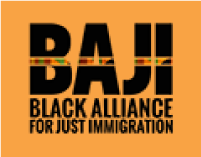Blog
Overview of webinar on BAJI’s CBP report Beyond The Border
For this year’s Protect Black Migrants week of action, BAJI hosted a webinar moderated by Nana Gyamfi, Executive Director of BAJI and panelists: Tsion Gurmu, Legal Director of BAJI and Dr. Amara Enyia, Policy Director for the Movement for Black Lives (M4BL). You can watch the video in its entirety here, and below is a summary of the discussion.
In the summer of 2020, after the murders of George Floyd and Breonna Taylor, demonstrations and uprisings across the US were led by Black folks demanding justice for the endless police murders of our loved ones. With the uprising we demanded a new vision of public safety not centered around policing, caging and the dehumanization of our lives.
The police response to this was predictable. Hidden away amongst this response was the presence of law enforcement agents from US Customs and Border Protection (CBP).
CBP is one of the world’s largest law enforcement agencies; it is no surprise that it has racist origins and continues to have a lack of transparency around their operations and countless violations of civil and human rights, including encounters that lead to civilian deaths. The number of CBP agents has continued to grow – as well as misconduct charges of agents and officers. Now, the Biden administration wants to increase funding for them; almost $1 billion more than their 2023 funding which was already more than $24 billion!
Since the 1980s CBP has been evolving into a heavily militarized federal law enforcement agency, with a general arrest authority, both on the federal and state level. After 9/11 they were absorbed into the new configuration of the Department of Homeland Security and “counter-terrorism” has since become one of their main priorities and functions.
The summer of 2020 was not their first domestic appearance; they were present as far back as the Los Angeles uprising of 1992 following the police beating of Rodney King. Hundreds of Latinx folks were deported despite no evidence that they were involved in any uprising-related offenses.
The presence of CBP during the 2020 racial justice uprising resulted in more people being charged with federal offenses instead of local ones. That meant longer and harsher sentences with people being incarcerated farther away from family and community. This is all part of an effort to curtail protests against injustice, which is curtailing our rights.
CBP says their function allows them to ignore the constitution which signals increased harm to our communities as they encroach further into an already problematic system of policing. Federal law banned most policing agencies from racial profiling our communities back in 2014 but CBP lobbied for an exemption. They actually say that racial profiling is an essential part of their work: “We’re looking for a specific clientele.”
CBP’s zone of operation is already large – 100 miles inward of any land or sea border. This area or “zone of action” is where two thirds of the US population currently lives.
In 2020, CBP was deployed outside its zone of action. Trump signed an executive order stating “buildings, grounds and property owned, occupied and secured by the federal government” could come under CBP’s purview, but they went well beyond that mandate. CBP arrested protestors that had nothing to do with federal property damage, they assisted with crowd control and other general policing functions. CBP maintains it has the authority to make searches and arrests in our neighborhoods.
It took BAJI and our partner, American Immigration Council, two years to receive thousands of pages of documents from the CBP regarding their activities during the summer of 2020 only for them to submit heavily redacted documents.
One of the significant things about our findings is that CBP will be racist to all Black and brown people no matter their immigration status or country of birth. Therefore, we must connect the dots between all law enforcement agencies as they work in tandem with each other.
We need for the exemption of CBP to racially profile to be eliminated, as well as their vast enforcement zone.
We must continue to expose CBP and to push back against their expanding authority. .
We must continue to call and organize for alternatives to defund and divest from the carceral system and invest in our communities.
We must also protect ourselves from the increased surveillance and threats to our safety that come with an increase in CBP’s resources. We should hold cyber security training for our organizations and communities, identify how police use of technology is harming our communities. Surveillance of our social media has happened and will continue.
We must remain vigilant!
